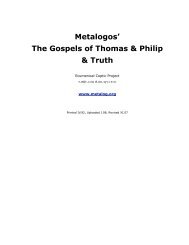Andrew Louth - Syriac Christian Church
Andrew Louth - Syriac Christian Church
Andrew Louth - Syriac Christian Church
Create successful ePaper yourself
Turn your PDF publications into a flip-book with our unique Google optimized e-Paper software.
192 OPUSCULE 3<br />
48A<br />
C<br />
D<br />
B<br />
Let no-one censure the doctrine that forbids a duality of<br />
gnomic wills, when they find that nearly all the glorious<br />
teachers say that there are two wills. Nor let him transfer his<br />
reverent mind to the other position, and say with Severus that<br />
there is one will, lest he let one evil follow another, I mean<br />
confusion follow division. 2 For the divine Fathers do not speak<br />
of quantity in relation to gnomic wills, but only in relation to<br />
natural wills, rightly calling the essential and natural laws<br />
and principles of what has been united wills. For they think<br />
that it is the natural appetency of the flesh endowed with a<br />
rational soul, and not the longing of the mind of a particular<br />
man moved by an opinion, that possesses the natural power of<br />
the desire for being, and is naturally moved and shaped by the<br />
Word towards the fulfilment of the economy. And this they<br />
wisely call the will, without which the human nature cannot<br />
be. For the natural will is ‘the power that longs for what is<br />
natural’ 3 and contains all the properties that are essentially<br />
attached to the nature. In accordance with this to be disposed<br />
by nature to will is always rooted in the willing nature. For to<br />
be disposed by nature to will and to will are not the same<br />
thing, as it is not the same thing to be disposed by nature to<br />
speak and to speak. For the capacity for speaking is always<br />
naturally there, but one does not always speak, since what<br />
belongs to the essence is contained in the principle of the<br />
nature, while what belongs to the wish is shaped by the<br />
intention [gnômê] of the one who speaks. So being able to<br />
speak always belongs to the nature, but how you speak<br />
belongs to the hypostasis. So it is with being disposed by<br />
nature to will and willing. If then to be disposed by nature to<br />
will and to will are not the same (for the one, I said, belongs to<br />
the essence, while the other exists at the wish of the one who<br />
wills), then the Incarnate Word possesses as a human being<br />
the natural disposition to will, and this is moved and shaped<br />
by his divine will. ‘For the will of that one’, the great Gregory<br />
says, ‘is not opposed to God but is completely deified.’ 4 If it is<br />
deified, it is clearly deified by its coming together with the One<br />
who deifies. What deifies and what is deified are certainly two,<br />
and not one and the same by nature. What deifies and what<br />
is deified are then related, and if they are related, they are<br />
certainly brought together, the one to the other, naturally, and<br />
each is thought of together with the other.<br />
Therefore, in his natural capacity, the Saviour is<br />
distinguished as a human being, willing in a fleshly way the<br />
shrinking in the face of death together with the rest of the




